尼日利亚税收制度概述
尼日利亚
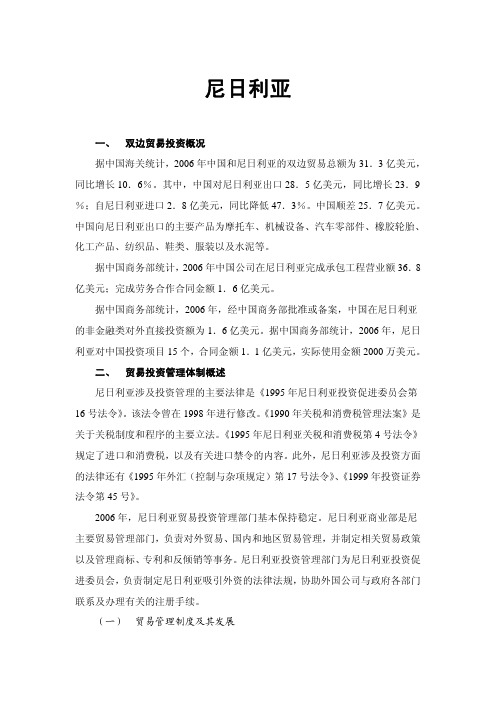
尼日利亚一、 双边贸易投资概况据中国海关统计,2006年中国和尼日利亚的双边贸易总额为31.3亿美元,同比增长10.6%。
其中,中国对尼日利亚出口28.5亿美元,同比增长23.9%;自尼日利亚进口2.8亿美元,同比降低47.3%。
中国顺差25.7亿美元。
中国向尼日利亚出口的主要产品为摩托车、机械设备、汽车零部件、橡胶轮胎、化工产品、纺织品、鞋类、服装以及水泥等。
据中国商务部统计,2006年中国公司在尼日利亚完成承包工程营业额36.8亿美元;完成劳务合作合同金额1.6亿美元。
据中国商务部统计,2006年,经中国商务部批准或备案,中国在尼日利亚的非金融类对外直接投资额为1.6亿美元。
据中国商务部统计,2006年,尼日利亚对中国投资项目15个,合同金额1.1亿美元,实际使用金额2000万美元。
二、 贸易投资管理体制概述尼日利亚涉及投资管理的主要法律是《1995年尼日利亚投资促进委员会第16号法令》。
该法令曾在1998年进行修改。
《1990年关税和消费税管理法案》是关于关税制度和程序的主要立法。
《1995年尼日利亚关税和消费税第4号法令》规定了进口和消费税,以及有关进口禁令的内容。
此外,尼日利亚涉及投资方面的法律还有《1995年外汇(控制与杂项规定)第17号法令》、《1999年投资证券法令第45号》。
2006年,尼日利亚贸易投资管理部门基本保持稳定。
尼日利亚商业部是尼主要贸易管理部门,负责对外贸易、国内和地区贸易管理,并制定相关贸易政策以及管理商标、专利和反倾销等事务。
尼日利亚投资管理部门为尼日利亚投资促进委员会,负责制定尼日利亚吸引外资的法律法规,协助外国公司与政府各部门联系及办理有关的注册手续。
(一) 贸易管理制度及其发展1.关税制度西非国家经济共同体(简称西共体)于2006年正式推出了共同关税制度。
西共体各成员国批准的共同关税制度包括4个方面,即初级产品进口关税税率为5%;半成品进口关税税率为10%,如原材料及其他工业产品;工业制成品关税税率为20%;奢侈品关税税率为50%。
油气企业在尼日利亚投资相关涉税问题

措施 ,希望能 为我国石油企业 实施 “ 走出去 ”战 略时处理 缴纳个 人所得 税 ,非尼 日利亚本 国居民仅 就其在尼 目利亚
好海外纳税 问题提供 指导和借鉴 。
一
获得 的收益 缴税 。但尼 日利亚 法律 规定 ,如非尼 日利亚居 民在 1 2个 月的期 间 内,在 尼 日利亚 居住 1 8 3天 以上 ( 含
பைடு நூலகம்
将 上一年度公 司财 务审计报告上交 联邦国内税收局 ,否则 职工每年 享受 3 0 0 0 奈拉 ,或者是相 当于 2 0 %的工资收入
按 照迟交天数进行相应罚款 。
( 二 )个人 所得 税
金 额作为残疾补助金 。
4 .额外津 贴 。下列两 种津贴 也可 免于征 税 : ( 1 )每
月薪 、周薪 、 津 贴补 助 、 奖金 、 交 易盈余 、 利息 、分红 、 1 9 9 3年 以来我 国石油企业 的海 外油气合作业务发展迅 括 : 猛 ,但 与此相关 的税务管理却 明显滞后 。本文总 结了中国 养老金 、年 金 ,以及来 自于许可他 人使用或占用其财产所
石油在尼 日利亚开展海外 油气 合作 7 年来 的办税 情况 ,提 获得 的收益等 。只要是个 人收入所 得 ,都要 依法纳税 。 出 了在尼 日利亚开展海外油气合作 业务可采取 的相关 税收
2 .纳税人 : 一般为生产企业 、批发商、进 口商。增值 部门代扣代缴公司所得税和个人所得税。付款方在支付费
税纳 税人必须在公司运营 后 6 个 月内履行增值税 注册。除 用时直接按 比例 代扣 ,收款方可 以凭付款 方开具 的发票 ,
从事上述商品或服务 的企业 以外 ,其他所有企业 均须在联 在 申报所得税时予以抵免 。尼 日利亚税法规定付款方最迟
税务规划尼日利亚财产征税扶贫方法的可持续发展挑战与前景
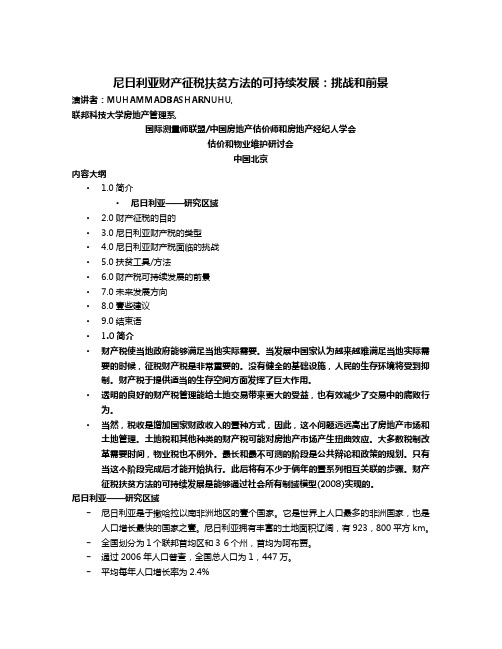
尼日利亚财产征税扶贫方法的可持续发展:挑战和前景演讲者:MUHAMMADBASHARNUHU,联邦科技大学房地产管理系,国际测量师联盟/中国房地产估价师和房地产经纪人学会估价和物业维护研讨会中国北京内容大纲• 1.0简介•尼日利亚——研究区域• 2.0财产征税的目的• 3.0尼日利亚财产税的类型• 4.0尼日利亚财产税面临的挑战• 5.0扶贫工具/方法• 6.0财产税可持续发展的前景•7.0未来发展方向•8.0壹些建议•9.0结束语• 1.0简介•财产税使当地政府能够满足当地实际需要。
当发展中国家认为越来越难满足当地实际需要的时候,征税财产税是非常重要的。
没有健全的基础设施,人民的生存环境将受到抑制。
财产税于提供适当的生存空间方面发挥了巨大作用。
•透明的良好的财产税管理能给土地交易带来更大的受益,也有效减少了交易中的腐败行为。
•当然,税收是增加国家财政收入的壹种方式,因此,这个问题远远高出了房地产市场和土地管理。
土地税和其他种类的财产税可能对房地产市场产生扭曲效应。
大多数税制改革需要时间,物业税也不例外。
最长和最不可测的阶段是公共辩论和政策的规划。
只有当这个阶段完成后才能开始执行。
此后将有不少于俩年的壹系列相互关联的步骤。
财产征税扶贫方法的可持续发展是能够通过社会所有制域模型(2008)实现的。
尼日利亚——研究区域-尼日利亚是于撒哈拉以南非洲地区的壹个国家。
它是世界上人口最多的非洲国家,也是人口增长最快的国家之壹。
尼日利亚拥有丰富的土地面积辽阔,有923,800平方km。
-全国划分为1个联邦首均区和36个州,首均为阿布贾。
-通过2006年人口普查,全国总人口为1,447万。
-平均每年人口增长率为2.4%-有250多个部族-尼日利亚位于非洲西部-南濒大西洋几内亚湾。
西同贝宁接壤,北和尼日尔交界,东北隔乍得湖和乍得相望,东和东南和喀麦隆毗连。
-尼日利亚于2007年经济外汇储备为513.2亿美元,而于2002年只有76.81亿美元。
NIGERIA TAX TYPES尼日利亚税收种类

COMPANIES INCOME TAX (CIT).Applicable tax law- Companies Income Tax Act. Persons subject to the Companies Income Tax:∙All companies incorporated in Nigeria with the exception of companies engaged in petroleum operations.∙All non-resident (foreign) companies that earn or derive income from Nigeria.∙All organizations limited by guarantee (institutions of public character or charitable organizations) engaged in profit making activities other than thepromotion of their primary objects.∙The liquidator, receiver, or agent of liquidator or receiver of any taxable company or organization.Where to pay the Companies Income Tax:∙Companies incorporated in Nigeria and organizations limited by guarantee pay Companies Income Tax through any of the designated banks. Once paymenthas been captured by the bank collecting system, an e-ticket is issued is issuedthe company, this e-ticket is proof of payment and when presented at theIntegrated Tax Office with jurisdiction an e-receipt will be issued.∙Non-resident companies make payment through remittance of tax deducted at source to the designated banks.How to pay the Companies Income Tax∙Resident companies and organizations prepare and submit annual self-assessment tax returns as specified by FIRS accompanied by the evidence ofthe payment of the full amount or first installment of the tax due. Payment ismade to designated banks∙Non-resident companies are subject to Withholding Tax (WHT) deductions on the income they earn from Nigeria. This becomes their tax upon filing returnsPETROLEUM PROFITS TAX (PPT)Applicable tax law- Petroleum Profits Tax Act. Persons subject to the Petroleum Profits Tax:∙Companies engaged in petroleum exploration and production operations in Nigeria (up-stream operations)∙ A person resident in Nigeria employed in the management of the petroleum operations carried on by a non-resident company∙The liquidator, receiver, or agent of liquidator or receiver of any company carrying on petroleum operations in Nigeria.Where to pay the Petroleum Profits Tax:Companies carrying on petroleum operations in Nigeria make offshore payments to JP Morgan Chase Bank, the bank then advises the Central Bank of Nigeria to enable the bank credit FIRS accordingly.How to pay the Petroleum Profits TaxEvery company engaged in petroleum operations prepares and submits annual returns as specified by the Petroleum Profits Tax Act within five months of the end of each assessment year. Payment is in two segments beginning with filing of estimated annual return not later than ending of February of each year. Payment for the tax due is then made in twelve monthly installments beginning from March of each year. Where the actual tax liability arising from the annual tax returns exceeds the cumulative estimated tax, a 13th month installment is payable and where the contrary is the case, a refund is due.VALUE ADDED TAX (VAT)Applicable tax law- Value Added Tax Act. Persons subject to the Value Added Tax: Any individual, corporation sole, group, body corporate or organization that consumes buys, procures or imports taxable goods or services is liable to pay the tax. How to pay the Value Added Tax∙During direct sales or open market transactions, the buyer or consumer shall pay the tax to the seller together with the cost of the goods or services bought. Theseller then nets off the VAT paid at the time of purchase of the stocks sold fromthe VAT collected on the stocks sold and credit the balance to FIRS.∙Where the goods or services were supplied to a government Ministry, Department or Agency (MDA) or a company engaged in oil operations, the VAT payable by the MDA or oil company is deducted or withheld at source (at thepoint of payment). It is then credited directly to FIRS on behalf of the supplier ∙VAT payments are made on a monthly basis not later than 21days of every subsequent month. Tax payers prepare and submit monthly VAT returnsaccompanied by evidence of payment of the tax due at designated banksWhere to pay the Value Added TaxVAT remittances may be made at any designated bank, an e-ticket is immediately issued as evidence of payment. This e-ticket may be presented at the ITO and an e-receipt will be issued the taxpayer.PERSONAL INCOME TAX (PIT)Applicable tax law- Personal Income Tax Act (PITA)∙Persons subject to the Personal Income Tax Individuals resident in the Federal Capital Territory, Abuja∙Families, communities, trustees and estates resident in the Federal Capital Territory∙Persons employed in the Nigerian Army, Nigerian Navy, Nigerian Air Force and Nigeria Police other than in civilian capacity.∙ A person resident outside Nigeria who derives income or profit from Nigeria ∙Officers of the Nigerian foreign serviceWhere to pay the Personal Income Tax∙Persons employed in the Nigerian Army, Nigerian Navy, Nigerian Air Force and Nigeria Police, other than in civilian capacity, pay income tax at the designated banks∙Individuals and enterprises in FCT pay at the designated banks, obtain an e-ticket and may request an e-receipt at the Individual and Enterprise Tax Office, Abuja.∙Organizations, companies and MDAs pay at designated banks, obtain their e-tickets and may request for the e-receipts at the Large Tax Office (LTO) Abuja. How to pay the Personal Income Tax∙Persons on paid employment pay their personal income tax through the Pay As You Earn (PAYE) system. Under the system, employers deduct the prescribed tax from workers’ salaries and pay directly to the FIRS through the designatedbanks on behalf of the employees on a monthly basisAny individual, corporation sole, group, body corporate or organizationSelf-employed individuals and enterprises prepare and submit annual self-assessment tax returns as specified by FIRS accompanied with evidence of payment of the full amount or first installment of the tax due. All payments are made at the designated banks.WITHHOLDING TAX (WHT)Applicable tax lawWithholding Tax (WHT) is not a distinct tax type and therefore has no legislation of its own. It is only a mechanism for the collection of other taxes. Consequently, its application is provided for in the enabling law of other tax types i.e. Section 81 of Company Income Tax Act, Section 54 of Petroleum Profit Tax Act, Section 73 of Personal Income Tax Act and Section 13 of Value Added Tax ActPersons subject to the Withholding TaxPersons subject to the various tax types may be subject to Withholding Tax deductions for the purpose of offsetting their tax liabilities. WHT deductions are regarded as advance payments (or payments on account) of the relevant tax liability that will arise from the tax returns of the period concerned.Where to pay the Withholding Tax:Where the person benefiting from the payment and the income are taxable, Withholding Tax (WHT) is paid (deducted) at the point of making payment. It is withheld by the payee and the net amount is then paid to the beneficiary through the designated bank(s).How to pay Withholding TaxThe amount deducted at the point of payment is remitted directly to FIRS through a designated bank in a prescribed format in the name of the person subject to the deduction.EDUCATION TAX (EDT)Tertiary Education Trust Fund (Establishment, Etc) Act, 2011. Persons subject to the Education TaxAll companies liable to Companies Income Tax are also liable to Education Tax. In other words, all companies registered or resident in Nigeria are liable to pay Education Tax. Where to pay the Education Tax:Education Tax is paid at the point of payment of Companies Income Tax or Petroleum Profits TaxHow to pay the Education TaxAs part of the annual Companies Income Tax self-assessment returns, taxable persons also compute and submit their Education Tax liabilities and make payment at the designated bankSTAMP DUTIES (STD)Stamp Duties Act. Persons subject to Stamp DutiesThe items and persons subject to stamp duties are instruments (written documents) relating to matters executed between a company and an individual, group or body of individuals. Instruments which may be subject to stamp duties include financial instruments/transactions, company memorandums and articles of association, statements of share capital ownership, bonds, conveyances on sale, depositions, lease agreements, mortgage bonds, debentures, etc.Where to pay Stamp DutiesStamp duties on eligible instruments can be paid through designated banksHow to pay the Stamp DutiesCompanies and persons issuing or dealing with all chargeable instruments shall submit such instruments to the Stamp Duties Office for stamping. The Commissioner of Stamp Duties shall then assess the instruments submitted in line with the provisions of the Stamp Duties Act and specify the duties payable. The duties are then paid to FIRS at the designated bankCAPITAL GAINS TAX (CGT)Capital Gains Tax Act. Persons and properties subject to the Capital Gains TaxAll companies incorporated in Nigeria which earn any capital gains or gains on the disposal of all forms of assets. All forms of property (whether situated in Nigeria or not) that are liable to capital gains tax include:∙Options, debts and incorporeal property generally;∙Any currency other than Nigerian currency; and∙Any form of property created by the person disposing of it, or otherwise coming to be owned without being createdWhere to pay the Capital Gains TaxCapital Gains Tax is paid at the designated at which the company making the chargeable capital gain pays its Companies Income Tax.How to pay the Capital Gains TaxIn line with the provisions of the Capital Gains Tax Act and the self-assessment regulations presently in operation, a company shall compute the gains on the disposal of all forms of assets in each year of assessment and submit same together with its Companies Income Tax returns. The returns shall also be accompanied by evidence of the payment of the full amount or first instalment of the tax due. Payment is made to the designated bank.NATIONAL INFORMATION TECHNOLOGY DEVELOPMENT FUND (NITDF) LEVY National Information Technology Development Agency Act, 2007. Persons subject to the NITDF LevyCompanies and enterprises with an annual turnover of N100,000,000.00 and above operating as:∙GSM Service Providers or telecommunications companies;∙Cyber companies and internet providers;∙Pensions managers and pension related companies;∙Banks and other financial institutions;∙Insurance companies.Where to pay the NITDF LevyThe levy is paid through the designated bank at which the chargeable companies pay their Companies Income TaxHow to pay the NITDF LevyAs part of its Companies Income Tax returns, a company shall compute 1% of the profit before tax of each year of assessment. The tax due shall then be paid to FIRS through the designated bank.。
尼日利亚工资标准-概述说明以及解释
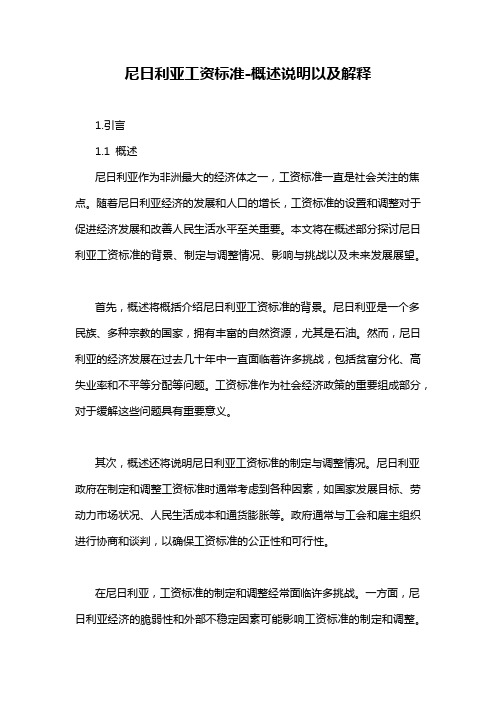
尼日利亚工资标准-概述说明以及解释1.引言1.1 概述尼日利亚作为非洲最大的经济体之一,工资标准一直是社会关注的焦点。
随着尼日利亚经济的发展和人口的增长,工资标准的设置和调整对于促进经济发展和改善人民生活水平至关重要。
本文将在概述部分探讨尼日利亚工资标准的背景、制定与调整情况、影响与挑战以及未来发展展望。
首先,概述将概括介绍尼日利亚工资标准的背景。
尼日利亚是一个多民族、多种宗教的国家,拥有丰富的自然资源,尤其是石油。
然而,尼日利亚的经济发展在过去几十年中一直面临着许多挑战,包括贫富分化、高失业率和不平等分配等问题。
工资标准作为社会经济政策的重要组成部分,对于缓解这些问题具有重要意义。
其次,概述还将说明尼日利亚工资标准的制定与调整情况。
尼日利亚政府在制定和调整工资标准时通常考虑到各种因素,如国家发展目标、劳动力市场状况、人民生活成本和通货膨胀等。
政府通常与工会和雇主组织进行协商和谈判,以确保工资标准的公正性和可行性。
在尼日利亚,工资标准的制定和调整经常面临许多挑战。
一方面,尼日利亚经济的脆弱性和外部不稳定因素可能影响工资标准的制定和调整。
另一方面,劳动力市场的不平衡和劳动力组织的权益保护问题也是制定和调整工资标准时需要关注的因素。
尼日利亚工资标准的制定与调整对社会经济发展具有重要影响。
适当的工资标准可以激励劳动力的工作积极性、提高生产力,并促进经济增长。
然而,不合理的工资标准可能导致劳动力的不稳定和社会的不平衡。
最后,概述将提供对尼日利亚工资标准的未来发展的展望。
随着尼日利亚经济的不断发展,工资标准的制定与调整将面临更多的挑战和机遇。
政府需要制定更加灵活和适应性强的政策,以缓解贫富差距,提高人民的生活水平。
同时,政府还需要与各方积极合作,加强对劳动力市场和劳动力组织的监管,以确保工资标准的公正性和可持续性。
综上所述,尼日利亚工资标准是一个复杂而重要的议题。
本文将在接下来的章节中深入探讨尼日利亚工资标准的制定与调整情况、影响与挑战以及未来的发展展望。
尼日利亚税收征收管理体制简介
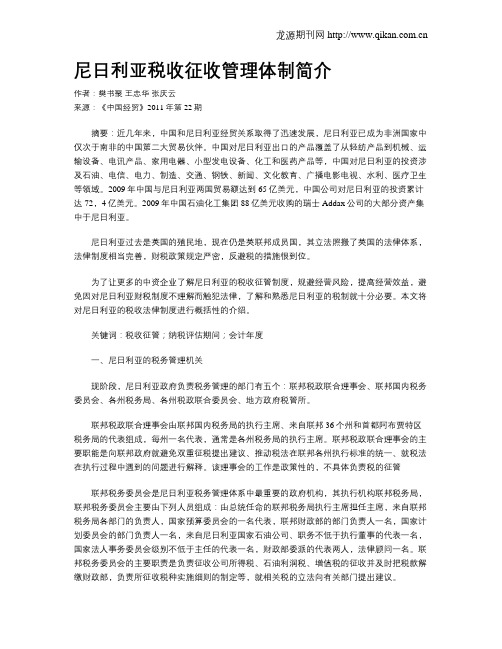
尼日利亚税收征收管理体制简介作者:樊书聚王忠华张庆云来源:《中国经贸》2011年第22期摘要:近几年来,中国和尼日利亚经贸关系取得了迅速发展,尼日利亚已成为非洲国家中仅次于南非的中国第二大贸易伙伴。
中国对尼日利亚出口的产品覆盖了从轻纺产品到机械、运输设备、电讯产品、家用电器、小型发电设备、化工和医药产品等,中国对尼日利亚的投资涉及石油、电信、电力、制造、交通、钢铁、新闻、文化教育、广播电影电视、水利、医疗卫生等领域。
2009年中国与尼日利亚两国贸易额达到65亿美元,中国公司对尼日利亚的投资累计达72,4亿美元。
2009年中国石油化工集团88亿美元收购的瑞士Addax公司的大部分资产集中于尼日利亚。
尼日利亚过去是英国的殖民地,现在仍是英联邦成员国,其立法照搬了英国的法律体系,法律制度相当完善,财税政策规定严密,反避税的措施很到位。
为了让更多的中资企业了解尼日利亚的税收征管制度,规避经营风险,提高经营效益,避免因对尼日利亚财税制度不理解而触犯法律,了解和熟悉尼日利亚的税制就十分必要。
本文将对尼日利亚的税收法律制度进行概括性的介绍。
关键词:税收征管;纳税评估期间;会计年度一、尼日利亚的税务管理机关现阶段,尼日利亚政府负责税务管理的部门有五个:联邦税政联合理事会、联邦国内税务委员会、各州税务局、各州税政联合委员会、地方政府税管所。
联邦税政联合理事会由联邦国内税务局的执行主席、来自联邦36个州和首都阿布贾特区税务局的代表组成,每州一名代表,通常是各州税务局的执行主席。
联邦税政联合理事会的主要职能是向联邦政府就避免双重征税提出建议、推动税法在联邦各州执行标准的统一、就税法在执行过程中遇到的问题进行解释。
该理事会的工作是政策性的,不具体负责税的征管联邦税务委员会是尼日利亚税务管理体系中最重要的政府机构,其执行机构联邦税务局,联邦税务委员会主要由下列人员组成:由总统任命的联邦税务局执行主席担任主席,来自联邦税务局各部门的负责人,国家预算委员会的一名代表,联邦财政部的部门负责人一名,国家计划委员会的部门负责人一名,来自尼日利亚国家石油公司、职务不低于执行董事的代表一名,国家法人事务委员会级别不低于主任的代表一名,财政部委派的代表两人,法律顾问一名。
尼日利亚矿业政策
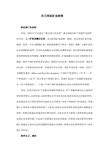
尼日利亚矿业政策特定部门负责制首先,2007矿产法通过“特定部门负责制”确定国家对矿产资源开发的管理手段。
设立矿权地籍办公室,作为管理矿权的唯一机构,负责受理矿权申请;批准、签发、中止及撤销矿权;接收和处置关于转让,更新、调整、让渡矿权及矿权范围的扩展等。
中央矿权地籍办公室设在首都阿布贾,对全国范围有最高的排他性的职权及管辖权。
根据管理便利的需要,矿权地籍办公室在全国设有分支机构,提供下列矿权注册登记项目:勘探许可证注册、探测许可证注册、采矿租约注册、小型采矿租约注册、水使用许可证注册、采矿许可注册。
同时,在矿产及钢铁发展部(Mines and Steel Development)下设矿产监查部门(17节)、矿产环保部门(18节)和小型及个体采矿部门,形成中央以矿产及钢铁发展部部长(以下简称部长)、下属三个部门和矿权地籍办公室各司其职的管理体系。
其次,在各州设立矿产资源及环境管理委员会,矿产资源理事会及土地使用和分配理事会。
总体来说,这些理事会并不对矿权及矿权持有者进行直接的管理,而是通过关注与采矿相关的当地社会公共利益,向各个职能部门作出建议,形成独立于管理者与被管理者的第三方意见,促使中央在管理矿权的过程中兼顾地方利益。
理事会的建议对象是部长和州政府,后者会在多大程度上采纳理事会的建议现在还无例可循,不过由于法律规定其在涉及赔偿、环保和土地分配等具体问题上的建议义务以及这些问题所代表的大宗利益,理事会在矿权管理环节上很可能大有作为。
程序公正、透明2007矿产法在矿权的申请和所有权方面做了一系列安排,基本可以保证程序的公正。
在矿权申请阶段,规定了“先到先得”制:当数份针对同一区域的申请,两个或以上有地点重叠的申请在同一个工作日被提交给矿权地籍办公室时,最早收到的符合规定的申请有优先权;当遇有针对同一专有区域的竞争性申请时,矿业地籍委员会必须严格遵照本法规定的“先到先受理”原则(8节)。
确定矿权区域的专属权,规定不得在同一区域重复设置矿权(58、60、65、68节)。
尼日利亚几项税收规定在实际工作中运用的思考

尼日利亚几项税收规定在实际工作中运用的思考贺炬【摘要】根据尼日利亚联邦政府的规定,政府项目在支付合同价款时由业主代扣两项税款,既5%增值税V.A.T和5%所得税Withholding。
这种有别于他国由付款人扣税的方法叫源头扣税。
这种方法虽然有利于保证政府的税收,防止税款的流失,但对于经营者来说则是强制执行的,而且往往有失公允。
如何使我们的经营活动适应尼国代扣税款的实际,如何使损失降低到最低限度,是我们每个经营环节都应深入研讨的课题。
本文仅就当地税款计算和代扣的几个问题做一些粗浅的探讨,以期对我们的经营工作有所裨益。
【期刊名称】《当代经济》【年(卷),期】2012(000)012【总页数】2页(P86-87)【关键词】税收规定;代扣税款;税款计算【作者】贺炬【作者单位】中国土木工程集团有限公司,北京100038【正文语种】中文【中图分类】F812.42根据尼日利亚联邦政府的规定,政府项目在支付合同价款时由业主代扣两项税款,既5%增值税V.A.T和5%所得税Withholding。
这种有别于他国由付款人扣税的方法叫源头扣税。
这种方法虽然有利于保证政府的税收,防止税款的流失,但对于经营者来说则是强制执行的,而且往往有失公允。
比如所得税的代扣,并不象一些西方发达国家那样进行年终汇算清缴,而是只上缴不清算,或者不能取得扣税收据,不能抵减应纳税数。
其结果可能有二:其一,相对于公司财务成果而言造成税款的多缴;其二,造成税款的提前入库。
这两种结果对承包商都是不利的。
前者是一种损失,后者影响经营者的资金运用,最少也会损失部分利息。
按这种强制性的做法,如果税款代扣太多,几年以后有可能争取一个缓扣所得税的“优惠待遇”。
但我们应考虑的问题是:若干年以后时过境迁,各种情况都有可能发生变化,造成的损失很有可能无法挽回。
从另一方面看,如果抛开“时过境迁”不谈,我们目前所承揽的项目确实利润颇丰,实际利润率达到或超过临界比率23.81%,那么争取几年后的缓扣税是有利的。
- 1、下载文档前请自行甄别文档内容的完整性,平台不提供额外的编辑、内容补充、找答案等附加服务。
- 2、"仅部分预览"的文档,不可在线预览部分如存在完整性等问题,可反馈申请退款(可完整预览的文档不适用该条件!)。
- 3、如文档侵犯您的权益,请联系客服反馈,我们会尽快为您处理(人工客服工作时间:9:00-18:30)。
尼日利亚税收制度概述
2010年02月08日
尼日利亚制定了完整的税法。
为方便我对外投资合作企业更好地了解当地税制,现作一简要介绍。
一、尼税收征管体系
尼实行联邦制,设有联邦、州和地方三级政府。
与此相对应,尼税收征管也实行联邦、州和地方三级管理,各级政府负责征收不同的税种。
(一)联邦税
联邦税由尼联邦国内税收局(Federal Inland Revenue Service)负责征收,主要包括公司所得税、石油利润税、增值税、教育税、公司资本收益税、公司印花税、公司扣缴税、信息技术发展费等税种。
此外,联邦首都区居民的个人所得税、个人扣缴税、资本收益税、印花税,尼外交部职员、警察人员、武装人员的个人所得税,以及非尼日利亚居民的个人所得税也由尼联邦国内税收局征收。
(二)州内税
州内税由各州的州内税收委员会(State Board of Inland Revenue)负责征收,主要包括州内居民的个人所得税、个人扣缴税、资本收益税、赌博和彩票税,以及商用场所注册费、州首府道路注册费等。
(三)地方税
地方税由地方政府税收委员会(Revenue Committee)负责征收,主要是与地方政府行政管理有关的税费,比如酒税、出生和婚姻注册费、公共广告费、州首府以外的道路注册费、动物牌照费、电视许可费等。
二、尼税收征管程序
尼税务征收以纳税人申报为主,税务机关负责监督和催缴。
纳税的基本程序如下:
1、纳税人在就近的联邦国内税收局办公室或地方税务部门注册,取得税务编号;
2、纳税人在规定的纳税期内开展自评,计算出应缴税额;
3、纳税人根据自评结果填写税务申报表,连同审计报表、固定资产表、负债表等报表,到税务部门核准的银行[1]缴税。
银行代收税款及各种申报表后,向纳税人出具收款凭证;
4、纳税人依据银行凭证向税务部门换取正式收据,并办理完税证明。
三、尼主要税种
(一)公司所得税
根据尼公司所得税法,公司应就其一个纳税年度内的全部收益缴纳所得税。
应税收益包括经营收入、租金、分红、利息、折扣、特许权使用费、养老金收益、年金,以及来自于短期货币工具如政府债券的收益等内容。
1、纳税人
在尼从事经营活动并获得收益的所有公司,均构成纳税义务人。
但在尼注册设立的公司,以其全球范围内的收益计算应税收益,外国公司仅以其在尼获得的收益缴纳所得税。
2、税率
根据尼公司所得税法,该税的税率为应税收益的30%。
但如果企业在一个纳税年度内未获得利润,或其取得的全部利润少于公司所得税法规定的最低标准,则应按照最低纳税标准缴税,具体如下:
(1)营业额少于50万奈拉(包括50万奈拉),且已从事经营至少4个日历年度的,最低纳税标准为毛利润的0.5%;或净资产的0.5%;或实缴资本的0.25%;或企业该年度营业额的0.25%,但最高不超过50万奈拉;取其中最高者。
(2)营业额大于50万奈拉的,除依据上述标准缴税以外,还应就超过50万奈拉营业额的部分,按0.125%的税率缴纳。
(3)从事农业经营的公司;有25%以上外国投资的公司;及新设经营4年以内的公司,免于缴纳最低纳税额。
3、豁免
根据公司所得税法,向尼教会组织、慈善组织、教育组织和科研机构提供的捐助,免于缴纳公司所得税,但豁免金额不得超过捐助公司该年度收益总额的10%,以防其规避所得税。
4、纳税时间
公司从事经营超过18个月的,申报所得税的时间应为企业会
3、豁免
根据尼个人所得税法,部分津贴、补助不超过以下限额的,可以不缴纳个人所得税,具体如下:
(1)150000奈拉住房补贴/年;
(2)15000奈拉交通补贴/年;
(3)5000奈拉餐饮补贴/年;
(4)10000奈拉公用事业补贴(水电煤气)10000/年;
(5)6000奈拉娱乐补贴/年;
(6)离职津贴,但最多不超过其年基础工资的10%。
(三)增值税
根据尼增值税法,增值税包含在商品价格以内,在消费链的每个环节上,由出售商品的企业代政府向其消费者收取商品价格5%的增值税。
由于企业在购入原料时被代扣税款(进项税),同时在销售商品时又收取税款(销项税),尼增值税法规定,企业应以月为单位计算净增值税(销项税-进项税),将代收的盈余税款上交税务部门,或就被多扣的部分办理退税。
1、豁免
根据尼增值税法,以下商品或服务免征增值税:药品、书籍和教学资料、婴儿用品、农产品和农业设备、肥料、农用化学品、出口商品、医疗服务、宗教服务、社区银行和按揭机构提供的服务,以及出口服务。
2、注册
亿奈拉的,应向联邦国内税收局缴纳信息技术发展费,费率为企业税前收益的1%。
具体的纳税企业包括:1、GSM服务提供商和所有的电信公司;2、信息技术公司和因特网提供商;3、银行、保险公司及其他金融机构;4、与养老金有关的公司及经理人。
四、中尼双边税务协定
为避免对企业所得双重征税和防止偷税漏税,中尼两国政府于2002年4月15日签署了《关于对所得避免双重征税和防止偷漏税的协定》》(以下简称《协定》)。
经履行生效所必需的法律程序,《协定》自2009年3月21日起生效,自2010年1月1日起执行。
根据该协定,我对外投资企业在尼设立公司的,该子公司在中国取得的收入缴纳中国税收后,再缴纳尼税收时可将该部分应税收益抵免;我对外投资企业未在尼设立公司,则它在尼获得的收益缴纳尼税收后,可在中国税收中将该部分税额予以抵免,从而避免对所得双重征税。
此外,尼日利亚目前已与英国、加拿大、比利时、法国、南非、荷兰、菲律宾、巴基斯坦、罗马尼亚等国签署了双边税收协定,我对外投资企业可利用上述协定避免被双重征税或多征税。
